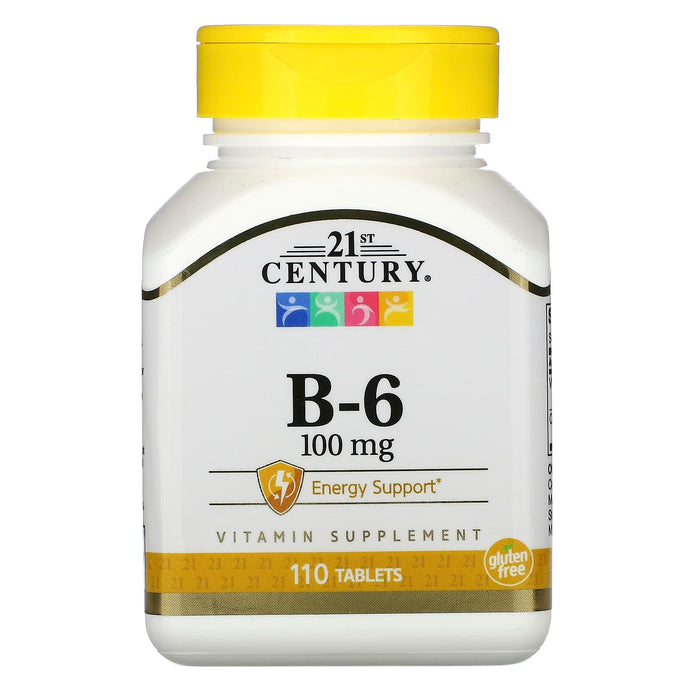




| Serving Size: 1 Tablet | ||
| Servings Per Container: 110 | ||
| Amount Per Serving | % Daily Value | |
| Vitamin B-6 (as Pyridoxine HCl) |
100 mg |
5,882% |
| Calcium (as Calcium Carbonate) |
160 mg |
12% |
Boost mood and brain function with 21st Century B-6, an essential nutrient for mental wellness and cognitive health.
Support your body's metabolism with this Vitamin B-6 (Pyridoxine Hydrochloride) supplement. B-6 plays a crucial role in the metabolism of foods, helping your body efficiently process nutrients.
As a vitamin supplement, adults take one (1) tablet daily with any meal or as directed by a healthcare provider. Do not exceed recommended dosage. Individual results may vary.
Cellulose, croscarmellose sodium, maltodextrin, silicon dioxide, stearic acid. Contains <2% of: Magnesium stearate.
No added sugar, yeast, preservatives, artificial flavors or colors.
Consult a healthcare provider prior to use if pregnant, nursing, on medications, have a medical condition or are planning a medical procedure. Stop use and contact a physician if adverse reactions occur.
Keep out of reach of children. Do not use if product appears to be tampered with or seal is broken. Store at room temperature.
At Health Orchard, we are committed to providing accurate product information and images. However, manufacturers may update their product packaging or ingredients, and these changes may not be immediately reflected on our website. It's possible for products to be shipped with different packaging than what is shown online. For the most accurate and safe use of any product, we advise reading the product's label, warnings, and instructions rather than relying solely on the details provided by Health Orchard.
Excessively high levels of vitamin B6 can cause neurological symptoms such as sensory neuropathy, ataxia, and decreased muscle tone. If you experience any unusual symptoms while taking a B6 supplement, discontinue use and consult with a healthcare professional.
Vitamin B6 plays a crucial role in protein metabolism, red blood cell formation, and the synthesis of neurotransmitters. It also supports immune function and helps regulate homocysteine levels.
Symptoms of vitamin B6 deficiency may include dermatitis, glossitis (inflamed tongue), anemia, confusion, depression, and weakened immune function. If you suspect a B6 deficiency, consult with a healthcare professional for proper diagnosis and treatment.
High levels of vitamin B6 without supplementation are rare but can occur due to certain genetic disorders or liver disease. If you have elevated B6 levels without taking supplements, consult with a healthcare professional for further evaluation.
The time it takes for B6 levels to return to normal after discontinuing supplementation varies depending on the individual and the dosage taken. In general, it may take several weeks to a few months for levels to normalize. Consult with a healthcare professional for personalized guidance.
Vitamin B6 levels can be raised through dietary sources such as poultry, fish, potatoes, and non-citrus fruits, as well as through supplementation. However, it's important to follow the recommended daily allowance (RDA) and consult with a healthcare professional before starting any new supplement regimen.
Vitamin B6 is water-soluble and typically excreted in the urine. Drinking plenty of water and maintaining a balanced diet can help support the body's natural elimination processes. However, if you have concerns about excessive B6 levels, consult with a healthcare professional for guidance.
Yes, excessively high doses of vitamin B6 (above 200 mg per day) can cause sensory neuropathy, a condition characterized by numbness, tingling, and pain in the hands and feet. If you experience any unusual symptoms while taking a B6 supplement, discontinue use and consult with a healthcare professional.
If you have high levels of vitamin B6, your healthcare provider may recommend limiting your intake of B6-rich foods such as poultry, fish, potatoes, and non-citrus fruits. However, it's important to consult with a healthcare professional for personalized dietary guidance based on your individual needs and health status.